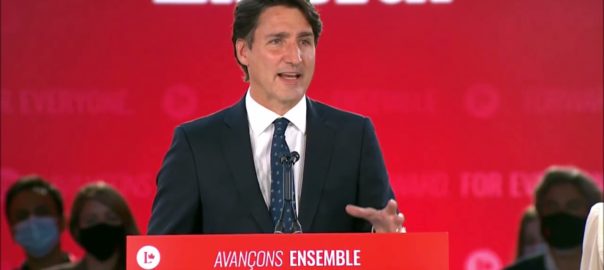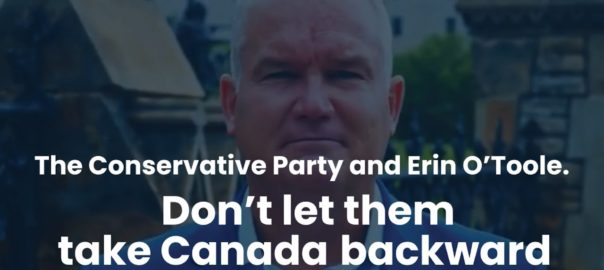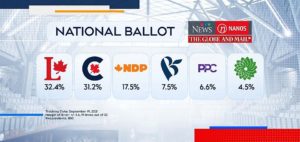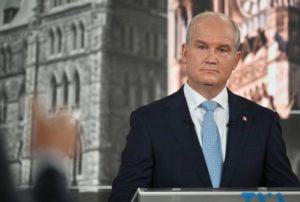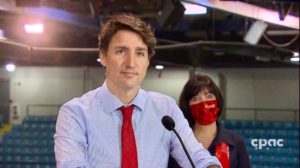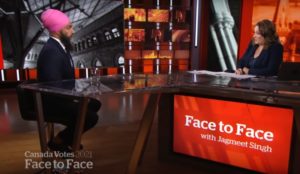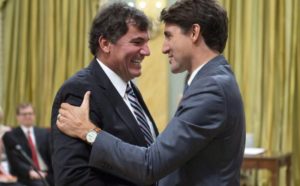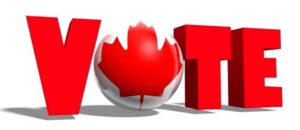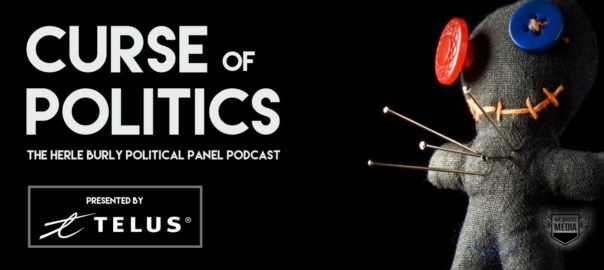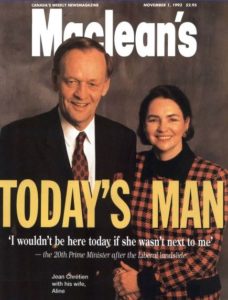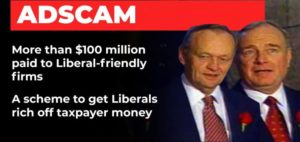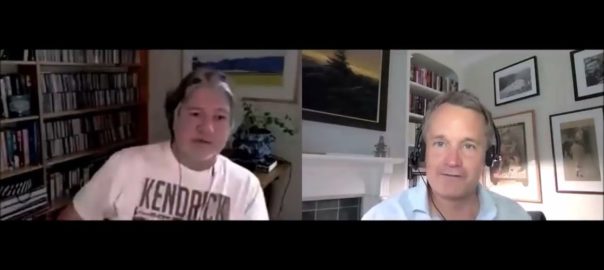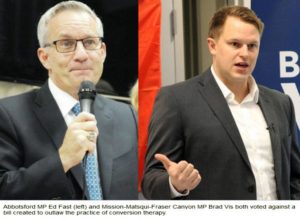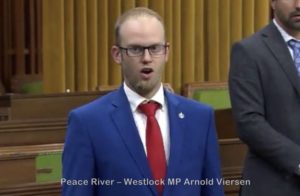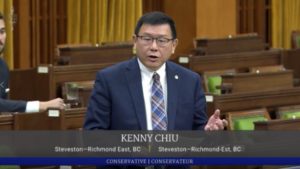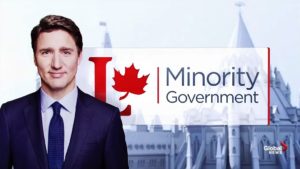

![]()
On Monday evening, Canadians returned a stable and responsible Liberal minority government, led by Prime Minister Justin Trudeau, to the halls of power in Ottawa and to Parliament, in an election that would appear on the surface not to change much. Only time will tell, of course, if the 2nd, 3rd and 4th parties will find themselves able to work with the Liberals in the interest of all Canadians, or whether they’ll return to their destructive and unproductive orientation of morbid partisan politics that defined their conduct prior to the calling of the August 15th election.
For VanRamblings, here are a few takeaways from the election …
1. Shachi Kurl cost Canadians and the Liberal Party a majority government. Going into the English Leaders’ debate, the Bloc Québécois had lost their footing, with all polls showing them unable to retain more than 10 seats in Parliament, for a loss of 22 seats. The support of Québeckers had moved to Justin Trudeau and the Liberal party — which looked to pick up most of the lost Bloc seats, propelling them to a majority government. Then Ms. Kurl asked a damnedly poorly phrased question concerning Québec Bill 21 — banning Québec citizens from wearing religious symbols, and mandating that one’s face be uncovered to give or receive specific public services — the contentious nature of her question propelling the Bloc into a stratospherically high, and unforgiving, seat count;
2. The NDP. In an entirely wrong-headed collusionary campaign with Erin O’Toole’s Conservative campaign team — that, it should be noted, won the NDP only one additional seat in Parliament — the NDP relentlessly joined the Conservatives in attacking the Prime Minister, yet never saying an unkind word about one another. Had it not been for Jason Kenney’s announcement of a vaccine passport for Albertans last week — which all but destroyed Erin O’Toole’s chance at winning government — the Tories would have won government, and thanks to the NDP, Canadians would not have realized the Liberal national child care plan, the continued ban on assault weapons, and the re-introduction of a bill banning conversion therapy, among a myriad of other progressive Liberal policies.
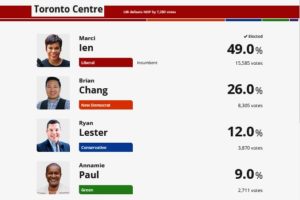
Annamie Paul is finished as the Green Party leader, and should have resigned on Monday night — but didn’t. Ms. Paul came in a distant fourth place in her home riding of Toronto Centre, securing only 9% of the vote for herself and the Green Party.
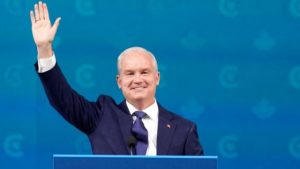
In Conservative Party leader Erin O’Toole’s re-tread of former Tory leader Andrew Scheer’s 2019 concession speech, Mr. O’Toole talked about working together with his Tory colleagues to win the next election. Sad for Mr. O’Toole, most members of his party are far to the right of the leader, and want him gone. The knives are already out for Mr. O’Toole — who is hanging onto his leadership with a hare’s breadth. Mr. O’Toole will resign his leadership within months of his status quo loss.

In happier Election Night stories: federal New Democratic Party candidate Bonita Zarrillo (above) — in the riding of Port Moody-Coquitlam — decisively won her second go-round at the polls, defeating near invisible Conservative Party parachute candidate Nelly Chin by a healthy 1,607 vote count.

Vancouver Granville NDP candidate Anjali Appadurai awaiting count of all polls, and mail-in ballots
At this writing, Vancouver Granville NDP candidate Anjali Appadurai finds herself in a near dead heat with Liberal Taleeb Noormohamed — behind by 230 votes — with 1 poll and the mail-in ballots yet to be counted.
. @CBCStephenQuinn…four social conservative incumbents lost in Metro Vancouver. That's significant and reflects declining tolerance for candidates who oppose abortion rights and who support conversion therapy.
— Charlie Smith (@charliesmithvcr) September 21, 2021
In Richmond Centre Liberal Wilson Miao handily defeated Conservative imcumbent Alice Wong, while in Steveston-Richmond East Liberal candidate Parm Bains absolutely thrashed the Conservative incumbent, Kenny Chiu.
I voted Liberal for $10 daycare. My child is 19, I have no grandchildren.
But, there's a single parent out there doing it on their own like I did, and $10 daycare would have made a world of difference.
— Leigh. (@Leighisdonex2) September 20, 2021
In Burnaby North-Seymour Liberal Terry Beech handily won a third term in office, with VanRamblings favourite, Fleetwood Port Kells Liberal incumbent, Ken Hardie, performing the same feat. Liberals’ Joyce Murray in Vancouver Quadra and Hedy Fry in Vancouver Centre were also gratefully victorious on election night.

Defeated candidates, the NDP’s Ruth Ellen Brosseau & recent Liberal Cabinet Minister, Maryam Monsef
In sad news: in Québec, Berthier—Maskinongé’s Ruth Ellen Brosseau lost her bid to return to Parliament, as did Ontario’s recent Liberal Minister for Women and Gender Equality and Minister of Rural Economic Development, Maryam Monsef.
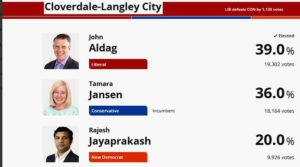
One final note: in perhaps the best news of the evening, now former Cloverdale-Langley City incumbent Tory MP, renowned climate change denier, and rampant homophobe and transphobe, not to mention activist anti-choice campaigner, Tamara Jansen, was unceremoniously unelected … yippee !!!
Post Election columns from The Globe and Mail (click on the links directly below)
Tory Leader Erin O’Toole’s ideology shift not enough to surpass Liberals
Jagmeet Singh still holds balance of power but NDP doesn’t make major seat gains
After failing to secure majority, Trudeau will face questions within his caucus
Looks like NDP candidate Blake Desjarlais is officially projected to win Edmonton-Greisbach.
Desjarlais will be the first openly Two-Spirit MP in Canadian parliament, which is HUGE #Elxn44
— Mel Woods (@intothemelwoods) September 21, 2021
Plus these reflections on Election Night 2021 (click on the links directly below)
CBC | Canadians have re-elected a Liberal minority government
Maclean’s | A win’s a win | Paul Wells
Vancouver Sun | Liberals hold onto battleground Metro Vancouver ridings
New York Times | Trudeau Projected to Remain PM, Falls Short of a Majority
Washington Post | Liberals win re-election, will lead minority government again
